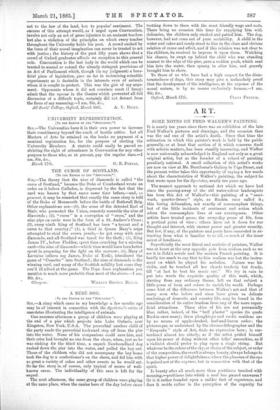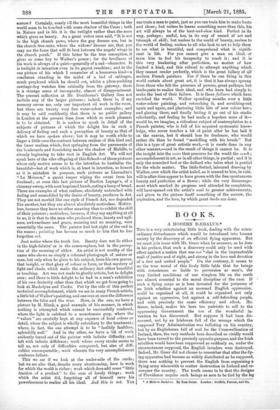ART.
SOME NOTES ON FRED WALKER' 8 PAINTING. IT is nearly ten years since there was an exhibition of the late Fred Walker's pictures and drawings, and the occasion then was the sad one of the artist's death. Since that time the estimation in which this painter's work is held by the public generally, or at least that section of it which concerns itself with artistic matters, has been steadily increasing, and Walker is now universally acknowledged in England not only as a great original artist, but as the founder of a school of painting peculiarly national. A small collection of this artist's works are now on view at Mr. Dunthorne's Gallery in Vigo Street, and the present writer takes this opportunity of saying a few words about the characteristics of Walker's painting, the subject he first wrote upon for the Spectator, nearly ten years ago.
The nearest approach to national Art which we have had since the passing-away of the old water-colour landscapists has been this Art of Walker's—this painting of a "semiwash, quarter-fresco" style, as Ruskin once called it; this loving delineation, not exactly of commonplace things, but of the little incidents of sentiment and action which adorn the commonplace lives of our countrymen. Other artists have treated prose, the every-day prose of life, from a poetical point of view ; others have set it down for our thought and interest, with sterner power and greater veracity. But few, if any, of the painters and poets have succeeded in extracting from what is familiar to us all, FO much of the inner secret of loveliness.
Superficially the most literal and realistic of painters, Walker was at heart at the very opposite pole from realisra such as we see it in Zola's novels and the modern French painting. It is hardly too much to say that to him realism was but the instrument on which he played his melodies. Nature was his violin, and he touched all her chords tenderly but firmly, till 'eat last he beat his music out." We try in vain to put into words the exquisite quality of this work, which, starting from any ordinary theme, left on that subject a little poem of form and colour to enrich the world. Perhaps some hint of the difference between Walker's art and that of many men who before and since have given us delicate renderings of domestic and country life, may be found in the consideration of its entire freedom from any of the more superficial attractions. These skies of his are not perennially blue, rather, indeed, of the "buff plaster" species (to quote Ruskin once more); these ploughboys and rustic maidens are by no means of apple-checked, beef-and-bacon order; the picturesque, as understood by the chromo-lithographer and the " Keepsake " style of Art, finds no expression here ; is stir'rendered almost too utterly, as if the artist prided himself upon his power of doing without other folks' necessities, as if a violinist should prefer to play upon a single string. But whatever be the colour of the sky, or choice of the subject, or order of the composition, the result is always beauty, always belongs to that higher power of delightfulness, where the pleasure of the eye is gained not at the expense, but in connection with that of the spirit.
Is beauty after all much more than prettiness touched with meaning,—prettiness into which a soul has passed unawares ? Or is it rather fonnded upon a sadder fact of experience, and does it reside rather in the perception of the capacity for sorrow P Certainly, nearly all the most beautiful things in the world seem to be touched with some shadow of the Cross ; both in Nature and in life it is the twilight rather than the noon which gives us beauty. As a great writer once said, "It is not in the high church pews, where the gay dresses are, but in the church free-seats, where the widows' dresses are, that you may see the faces that will fit best between the angels' wings in the church porch." If this latter be the true conception, it gives us some key to Walker's power ; for the loveliness of his work is always of a quiet—generally of a sad—character. It is twilight in intention even in its gayest sunshine; and in the one picture of his which I remember of a humorous kind—a coachman standing in the midst of a bed of cabbages, much perplexed which he should cut, whilst a plum-pudding carriage-dog watches him critically from the gateway, there is a strange sense of incongruity, almost of disappointment. The present collection at Mr. Dunthorne's Gallery does not include any of the larger pictures ; indeed, there is, if my memory serves me, only one important oil work in the room, but there are twenty very fine water-colour examples ; and it may be said confidently that there is no public gallery in London at the present time from which so much pleasure is to be obtained. It is useless to speak in detail of the subjects of pictures of which the delight lies in such a delicacy of feeling and such a perception of beauty as that of which we have spoken above ; but it may be worth while to linger a little over the contrast between realism of this kind and the baser realism which, first springing from the pavements of the boulevards and flourishing under the shadow of Mabille, is already beginning to take root in English Art. We will not speak here of the viler offspring of this School—of those pictures whose only motive seems to be the intention to bestialise the beautiful—but of work which is, at least in intention, as honest as it is mistaken in purpose, such pictures as Lhermitte's "Le Moisson," a gaunt reaper wiping the sweat from his forehead; or even this last picture of Bastien Lepage's, of a chimney-sweep, with soot-begrimed hands, eating a lump of bread. These are examples of what realism, absolutely untouched with feeling and unmodified by the desire of beauty, produces in Art. They are not morbid like one style of French Art, nor degraded like another, but they are almost absolutely motiveless. Motiveless, because they have no other meaning than to exhibit the skill of their painters ; motiveless, because, if they say anything at all to us, it is that to the man who produced them, beauty and ugliness, awkwardness and grace, meaning and no meaning, were essentially the same. The painter had lost sight of the end in the means ; painting has become so much to him that he has forgotten art.
Just notice where the truth lies. Beauty does not lie either in the high-falutin' or in the commonplace, but in the perception of the meaning of either. An artist is not worthy of the name who shows us simply a coloured photograph of nature or man, but only when he gives to his subject, from his own genius, that insight, or that glory of colour or form, or that mystery of light and shade, which make the ordinary fact either beautiful or touching. Art was not made to glorify artists, but to delight men ; and there is little delight to be had in a man's exhibition of his own dexterity other than that which we get from going to look at Maskelyne and Cooke. Put by the side of this perfect technical accomplishment, which we see in many French artists, a little bit of Walker's painting, and one sees at once the difference between the false and the true. Here, in the one, we have a picture by M. Blank, a good example of his manner, in which nothing is attempted which cannot be successfully rendered, where the light is subdued to a monotonous grey, where the " values" are carefully kept at any expense of local colour or detail, where the subject is wholly subsidiary to the treatment; where, in fact, the one attempt is to be "faultily faultless, splendidly null." And in the other, we have a bit of work evidently forced out of the painter with infinite difficulty, and left with infinite diffidence ; work where every stroke seems to tell us, not only of difficulties conquered, but also of difficulties unconquerable ; work wherein the very accomplishment confesses failure.
This we see if we look at the under-side of the cards ; but we see also that, despite every shortcoming, here is work for which the world is richer ; work which does add some "little fraction of a product" to the sum of lovely things ; work which the artist did, forgetting all of himself save his powerlessness to realise all his ideal. And this is art. You
can train a man to paint, just as you can train him to make boots and shoes ; but unless he learns something more than this, his art will always be of the boot-and-shoe kind. Perfect in its way, perhaps ; useful, too, in its way of record of art and triumph of skill; but .useless to the world of beauty, useless to the world of feeling, useless to all who look to art to help them to see what is beautiful, and comprehend what is significant in life. For you cannot give a man an ideal, or train him to feel his incapacity to reach it ; and it is this very hankering after perfection, no matter of how limited a kind, and this refusal to attempt anything which they cannot render perfectly, which is the great fallacy of all modern French painters. For if there be one thing in this world certain about great art, it is that it has always sprang from those who felt the presence of powers, great perhaps, but inadequate to realise their ideal, and who have had simply to make the best of their failure. It is these failures which have enriched the world. ' Walker spending months over a little water-colour painting, and retouching it, and scrubbing-out again and again, and plastering little bits of new colour here, and glazing there, and finally letting it go out of his studio reluctantly, and feeling he had made a hopeless mess of it— would be, we imagine, a ridiculous subject of contemplation to a French painter, who is full of his acquired systematic knowledge, who never touches a bit of paint after he has laid it on the canvas, lest it should lose its freshness, who would rather die than be found "modelling with his brush." But this is a type of great artistic work,—it is rarely done in any other manner,—and in the result of things it cannot be. It is the insight into the more that procures for the world the much accomplishment in art, as in all other things, is partial ; and it is only the conceited fool or the dullard who takes what is partial for the whole matter. The little-fretted, laboured drawing by Walker, over which the artist toiled, as it seemed to him, in vain, will in after-time appear to have grown with the free spontaneous beauty and perfection of a flower; while the very discouragement which marked its progress and attended its completion, will have opened out the artist's soul to greater achievements, and given to the picture itself something of the sorrow, the aspiration, and the love, by which great deeds are done.



































 Previous page
Previous page